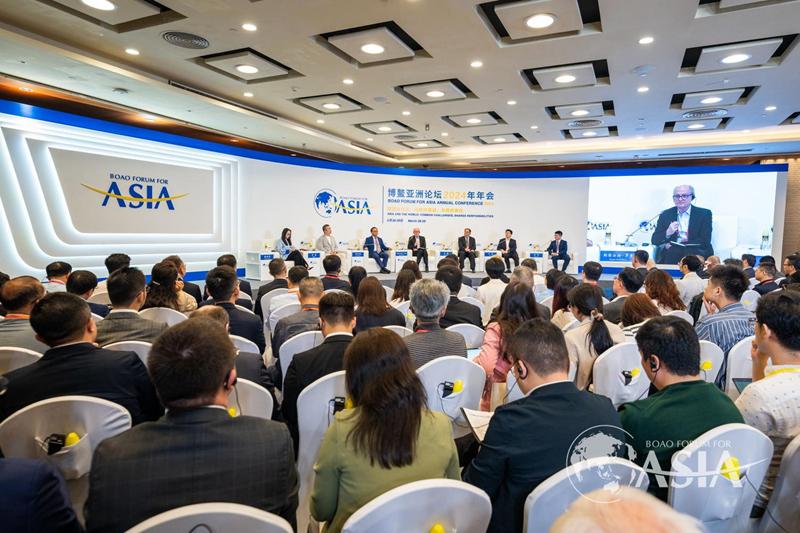
 0 Comment(s)
0 Comment(s) Print
Print E-mail China.org.cn, March 28, 2024
E-mail China.org.cn, March 28, 2024

A panel discussion themed on "AIGC Reshaping the World" during the Boao Forum for Asia (BFA) Annual Conference 2024 in Boao, south China's Hainan province, March 27, 2024. [Photo courtesy of BFA]
The technological advancements and industrial transformations driven by artificial intelligence have captured global attention, making it a key focus at the 2024 Boao Forum for Asia, held from March 26 to 29 in the resort town of Boao, south China's Hainan province.
Scholars and industry experts in AI engaged in a panel discussion on March 27, delving into its breakthroughs, applications, risks and challenges, aiming to build a consensus for its healthy development.
Professor Kyoung Mu Lee from Seoul National University stated, "It is almost time to enter the era of artificial general intelligence," highlighting AI's potential integration into various machines, such as vehicles and robots.
Stuart Russell, author of "Artificial Intelligence: A Modern Approach" and a professor of computer science at the University of California, Berkeley, acknowledged the significant advancements in AI in recent decades, particularly in language processing, as evidenced by models like ChatGPT.
"I think the performance of the large language models is really impressive," he remarked. "It gives us a taste of what it would be like to live in a world where we could access intelligence on tap in the same way that we access electricity anytime we need."
However, he noted that substantial gaps still exist in this technology, emphasizing that addressing these challenges requires international collaboration in both research and regulation.
Liu Cong, vice president of China's AI and intelligent speech giant iFLYTEK, noted the global trend toward large models and China's significant progress in this area over the past year. He emphasized that large models are advancing AI to a new stage of development in industrial applications, with "AI plus" likely becoming a key driver for developing new quality productive forces.
Regarding AI's role in empowering industries, Zhou Feng, CEO of Youdao, an intelligent learning company under NetEase, stressed the importance of identifying market opportunities through practical applications. He highlighted that 2024 will be a crucial year for the development of large models, with Youdao planning to expand the use of these systems across more products.
Education is an ideal domain for large-model implementation, and AI enables personalized education on a large scale, said Liu Renlei, senior vice president of Youdao.
Last year, the company introduced its virtual spoken language coach, designed to customize teaching for individual needs. This innovation is powered by "Zi Yue," China's first major educational model with language understanding and interaction capabilities.
In discussing the potential of AI companies in China, Russell highlighted the progress made by tech giants such as Baidu, Alibaba and Tencent, along with specialist educational firms.
He noted, "Education is an area where present AI technology can deliver significant value this decade. We could provide high-quality individual education to every child on earth."
Looking ahead, Russell emphasized the importance of data availability and well-structured business processes in enabling AI systems to integrate effectively. He also underlined the necessity for AI systems to function reliably and provide accurate answers.
He concluded that the next milestone is to show that AI systems can be built to learn and generalize in a manner akin to humans, with internal operations that are understandable.
Go to Forum >>0 Comment(s)